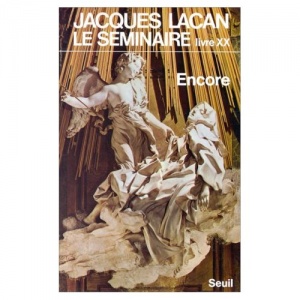Difference between revisions of "Seminar XX"
| Line 1: | Line 1: | ||
[[Image:Sem20.jpg|thumb|right]] | [[Image:Sem20.jpg|thumb|right]] | ||
| − | + | ''Le séminaire, Livre XX: Encore, 1972-1973''. Paris: Editions du Seuil. 1975. | |
English version: ''The Seminar of Jacques Lacan, Book XX: Encore, On Feminine Sexuality, The Limits of Love and Knowledge 1972-1973''. Ed. J.-A. Miller. Trans. B. Fink. New York: Norton, 1998. | English version: ''The Seminar of Jacques Lacan, Book XX: Encore, On Feminine Sexuality, The Limits of Love and Knowledge 1972-1973''. Ed. J.-A. Miller. Trans. B. Fink. New York: Norton, 1998. | ||
| − | + | On Feminine Sexuality the Limits of Love and Knowledge: The Seminar of Jacques Lacan, Book XX Encore 1972-1973 (Seminar of Jacques Lacan, Bk 20). | |
| + | ==Back Cover== | ||
| + | [[Lacan]] takes us on a startling psycholinguistic exploration of the bounds of [[love]] and [[knowledge]]. | ||
| − | + | Often controversial, always inspired, [[French]] [[intellectual]] [[Jacques Lacan]] begins the twentieth year of his famous [[Seminar]] by weighing theories of the relationship between the [[desire]] for [[love]] and the attainment of [[knowledge]] from such influential and diverse thinkers as [[Aristotle]], [[Marx]], and [[Freud]]. | |
| + | From here he leads us through [[mathematics]], [[philosophy]], [[religion]], and, naturally, [[psychoanalysis]] into an entirely new and unexpected way of interpreting the two most fundamental [[human]] [[drive]]s. | ||
| − | + | Anticipated by English-speaking readers for more than twenty years, this annotated translation presents [[Lacan]]'s most sophisticated work on [[love]], [[desire]], and [[jouissance]]. | |
| − | |||
| − | + | ==Description== | |
| + | ''Seminar XX'' is [[Lacan]]'s major work on [[feminine]] [[sexuality]]. | ||
| + | |||
| + | In particular he explores the question of [[feminine]] [[desire]] that was absent from his earlier theory of the [[phallus]]. | ||
| + | |||
| + | It is a short [[seminar]] with only 11 presentations and many of these are rather enigmatic and aphoristic, if they are not read in relation to the discussion of [[courtly love]] in ''[[Seminar VII]]'' and the formulation of ''[[jouissance]]'' and [[drive]] in ''[[Seminar XI]]''. | ||
| + | |||
| + | ''[[Seminar XX]]'' develops the idea that the '[[woman does not exist]]' and that she is '[[not-whole]]', but also goes beyond the discussions of [[feminine]] [[sexuality]] to consider the relationship between ''[[jouissance]]'' and [[love]] and the idea of ''[[jouissance]]'' as the ultimate [[limit]] of [[human]] [[knowledge]]. | ||
| + | |||
| + | In the seminar ''[[Encore]]'', [[Lacan]] proposed what he called "[[formulas of sexuation]]" to set down the basic structures of [[male]] and [[female]] [[sexuality]]. | ||
| + | |||
| + | ==More== | ||
| + | |||
| + | |||
| + | ==See Also== | ||
| + | |||
==References== | ==References== | ||
<references/> | <references/> | ||
| − | + | * [[Žižek, Slavoj]]. (2000) [[The Fragile Absolute]], or Why the Christian Legacy is Worth Fighting For, London and New York: Verso. p. 115, 116, 118, 143 | |
| − | |||
| + | [[Category:Seminar]] | ||
| + | [[Category:Seminars]] | ||
[[Category:Jacques Lacan]] | [[Category:Jacques Lacan]] | ||
[[Category:Works]] | [[Category:Works]] | ||
[[Category:Psychoanalysis]] | [[Category:Psychoanalysis]] | ||
[[Category:Sexuality]] | [[Category:Sexuality]] | ||
Revision as of 23:03, 23 June 2006
Le séminaire, Livre XX: Encore, 1972-1973. Paris: Editions du Seuil. 1975. English version: The Seminar of Jacques Lacan, Book XX: Encore, On Feminine Sexuality, The Limits of Love and Knowledge 1972-1973. Ed. J.-A. Miller. Trans. B. Fink. New York: Norton, 1998.
On Feminine Sexuality the Limits of Love and Knowledge: The Seminar of Jacques Lacan, Book XX Encore 1972-1973 (Seminar of Jacques Lacan, Bk 20).
Back Cover
Lacan takes us on a startling psycholinguistic exploration of the bounds of love and knowledge.
Often controversial, always inspired, French intellectual Jacques Lacan begins the twentieth year of his famous Seminar by weighing theories of the relationship between the desire for love and the attainment of knowledge from such influential and diverse thinkers as Aristotle, Marx, and Freud.
From here he leads us through mathematics, philosophy, religion, and, naturally, psychoanalysis into an entirely new and unexpected way of interpreting the two most fundamental human drives.
Anticipated by English-speaking readers for more than twenty years, this annotated translation presents Lacan's most sophisticated work on love, desire, and jouissance.
Description
Seminar XX is Lacan's major work on feminine sexuality.
In particular he explores the question of feminine desire that was absent from his earlier theory of the phallus.
It is a short seminar with only 11 presentations and many of these are rather enigmatic and aphoristic, if they are not read in relation to the discussion of courtly love in Seminar VII and the formulation of jouissance and drive in Seminar XI.
Seminar XX develops the idea that the 'woman does not exist' and that she is 'not-whole', but also goes beyond the discussions of feminine sexuality to consider the relationship between jouissance and love and the idea of jouissance as the ultimate limit of human knowledge.
In the seminar Encore, Lacan proposed what he called "formulas of sexuation" to set down the basic structures of male and female sexuality.
More
See Also
References
- Žižek, Slavoj. (2000) The Fragile Absolute, or Why the Christian Legacy is Worth Fighting For, London and New York: Verso. p. 115, 116, 118, 143
